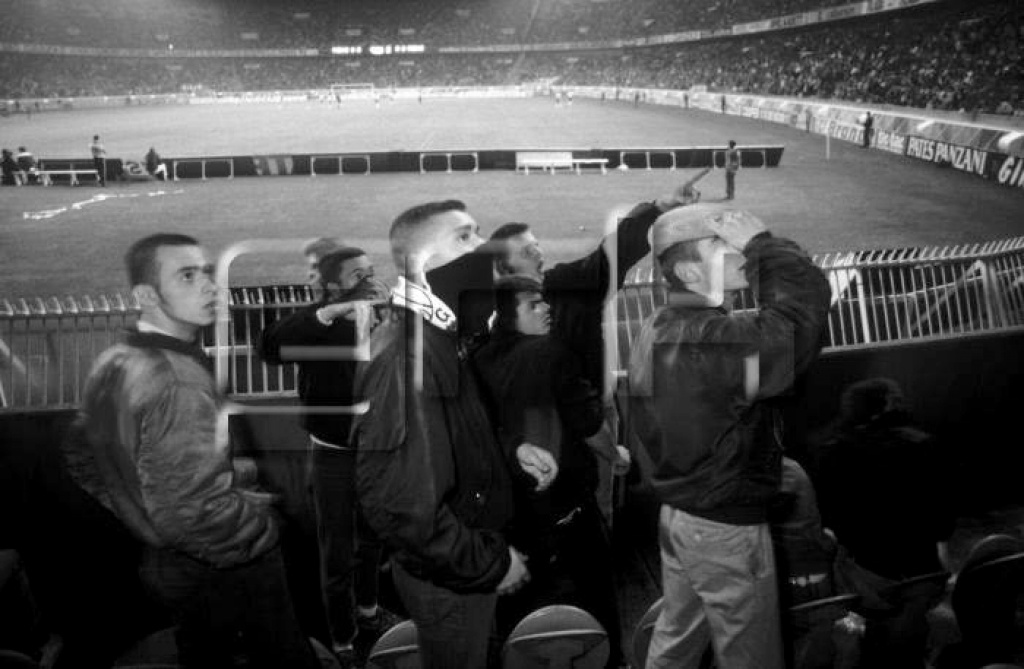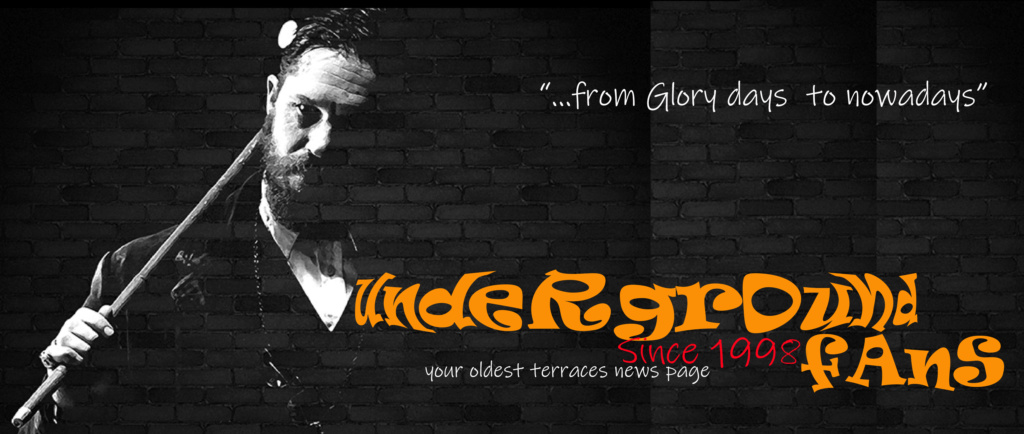A history of hooliganism in the trouble spots of Europe - 05/02/1995Source : Independent.co.uk
England Worst incidents 1984 31 policemen injured when Millwall fans riot at Luton.
1985 Heysel stadium, Brussels: 39 die in European Cup final.
1985 Fan died after riot at Birmingham City v Leeds match.
1988 European Championship in West Germany: 394 fans detained.
1993 197 arrested in Amsterdam after World Cup qualifier against Holland.
Combative measures Clubs banned from Europe after the Heysel disaster. Hillsborough disaster in 1989 provoked the Taylor Report which insisted on all-seater stadia.
Worst fans "Superhooligan" groups emerged in early 1980s: Chelsea's "Headhunters", West Ham's ICF (Inter City Firm), Leeds' "Service Crew", the "Bushwhackers" of Millwall and the "Baby Squad" of Leicester City.
Reputation at internationals The worst reputation of all. The 1986 World Cup was last international tournament when fans managed not to disgrace themselves. Infiltration by right-wing groups often held to be the cause.
Racism problems Incidents, such as banana-throwing at John Barnes at Liverpool and Mark Walters at Rangers, now rare. Many supporters' factions now combating the problem, particularly in club fanzines.
State of the nation Improving, though national ill health is far from cured as Millwall fans proved at end of last season.
FRANCE Worst incidents 1980 Police use batons to disperse mob at Strasbourg v Nantes fixture who tear up seats and set fire to rubbish on the pitch.
1993 10 policemen seriously hurt in fights with Paris St-Germain fans, said to be skinheads and neo-Nazi sympathisers, during match against Caen.
1994 Riot from home fans after referee sent off Marseille goalkeeper.
Combative measures Anxious to eradicate the problem ahead of 1998 World Cup, legislation was introduced in 1993: swift trial for acts of hooliganism and up to three years in prison.
Worst fans Paris St-Germain's "Boulogne Boys" are the highest profile. Marseille and St Etienne also have hooligan history, but negligible compared to PSG. "Boulogne Boys" come from city suburbs and announce their unity with scarves and T-shirts. Chelseaand Millwall shirts are newly in fashion for PSG's worst.
Reputation at internationals No record of violence at international level. Rugby is closer to the nation's heart; football fails to stir the passions it does in other European countries.
Racism problems Rise of Front National appears not to have hit the terraces. French crowds are perhaps the most ethnically mixed in Europe.
State of the nation Problem believed to growing last season due to consistent trouble with PSG fans. This season, though, has been quiet.
GERMANY Worst incidents 1979 70 hurt when Hamburg supporters celebrate championship victory.
1982 16-year-old boy died in fight between Hamburg and Werder Bremen.
1982 Bayern Munich fans shouting "Sieg Heil" attacked May Day rally; 138 injured.
1988 German and English fans in all-night battle at European Championships.
1991 Fan shot dead by police in fight between Leipzig and Berlin fans.
Combative measures Early 1980s saw introduction of "Fan Projects": academic studies of the hooligan phenomena and social work with convicted hooligans.
Worst fans FC Cologne's "Cologne Boys", Eintracht Frankfurt's "Adlerfront" (Eagle's Front) and Schalke 04's "Gelsen Sene". Dynamo Desden received two-year European ban in 1992 for riot during match against Red Star Belgrade.
Reputation at internationals Poor. Riots in Gothenburg at the 1992 European Championship almost matched the English in Malmo for the carnage caused. Fans at internationals known to shout "Deutschland hooligans".
Racism problems Nationalist groups rooted in football. The backlash: in Dec 1992, all teams played with "Mein Freund ist Auslander" on their shirts. Antony Yeboah fans at Frankfurt formed anti-racist "Yeboah's Witnesses".
State of the nation Improving, though sparks of hooligan regeneration have been noted in the lower leagues and in the countryside.
GREECE Worst incidents 1980 35 injured in Paok v Panathinaikos fixture when crowd pelted officials with stones and bricks.
1983 Aris fan stabbed and killed by Panathinaikos fans.
1986 Paok fan stabbed to death by AEK Athens fan on eve of match.
1985, 1991 Two fans killed in incidents when struck by fireworks.
Combative measures No effective measures introduced - the hooligans appear to have won. First Division crowds averaged 11,250 in 1988 and dropped to 3,680 last season.
Worst fans Athens clubs are worst offenders. AEK Athens: hooligans split in two factions, the "AEK Originals" and "Gate Seven". Olympiakos hooligans leave no one guessing; they call themselves "Hell". Paok banned from Europe in 1992 after rioting stopped a match against Paris St-Germain at half-time.
Reputation at internationals Good, possibly because so few fans travel to internationals abroad. Very few even watch at home: 3,500 attended the friendly against England in 1989.
Racism problems Not a large problem compared with European neighbours.
State of the nation Gradual improvement, probably due to the rapid fall in attendances.
HOLLAND Worst incidents 1982 Den Haag's stadium set on fire by vandals after 4-0 defeat.
1988 European Championship in Munich: Dutch fans' clash with English in Dusseldorf, billed as a "major showdown", never occurred. Throughout the competition, "Oranje" supporters, trouble-makers by reputation, were noted for their carnival atmosphere. Atthe final, however, 80 were arrested.
Combative measures 1992: Dutch FA institute wide ranging initiative to combat racism and discrimination.
Worst fans Larger clubs have the problems: Ajax, Feyenoord and Utrecht. Meeting between rival top clubs, Ajax and Feye-noord, sometimes violent. Worst reputation used to belong to Feyenoord: no ground would stage its Cup final with Den Bosch in mid-1980s and the match was played in the Dutch FA's training ground.
Reputation at internationals British tabloids put Holland second behind England in their "horror charts" prior to 1988 European Championship. But Dutch behaviour is not half as poor as the British press would have us believe.
Racism problems Right-wing influences have arrived from Germany. Anti-Semitic chants are often directed against fans of Ajax, a club with links to Amsterdam's Jewish community.
State of the nation Situation improved throughout 1990s.
ITALY Worst incidents 1920 Police intervene in fight between Viareggio and Lincques players, one of whom shot the referee dead. Crowd riot.
1963 Salerno's pitch invaded by 2,000 fans. Riot ensued, one fan killed.
1979-94 Five people died in fights at or near football stadia.
Oct 1994 10 hospitalised in Naples fight, policeman stabbed by fan in Brescia.
Jan 1995 Death of Vincenzo Spagnolo.
Combative measures Today's non-sporting day of mourning. Identity cards, bans on some fans, heavier policing and faster sentencing for hooligans are all being discussed.
Worst fans Milan's gangs such as the "Tiger Commandos" and the "Red and Black Brigades". Local rivalries usually most problematic - Roma v Lazio particularly. North v South antagonism known to break into violence.
Reputation at internationals Hardly any. Groups of travelling fans are very mixed in age with a comparatively high proportion of women.
Racism problems Che Guevara's face common on banners in 1980s. 1992: players sported "No al razzismo" (no to racism) shirts, some stadia greeted them with racist slogans. Ruud Gullit active in fight against racism.
State of the nation Poor and getting worse. Hooliganism hardly existed 10 years ago.
SPAIN Worst incidents 1981 Seville v Southampton, Kevin Keegan struck by botle thrown from crowd.
1982 Valencia v Manchester United, United fans attacked by police and local fans inside the stadium.
1991 Espanol supporter stabbed to death by a Barcelona gang.
Combative measures Clubs have tackled the problem by coming together with violent factions, incorporating them in to the clubs and helping them print literature.
Worst fans Real Madrid's "Ultra Sur", who inhabit the Bernabeu's south stand, Atletico Madrid's "Frent Atletico" (Atletico Front) and Barcelona's "Boixos Nois" (Crazy Boys). Spain is so big (Barcelona to La Coruna is 1200km) that travelling support is rarely large. Madrid's derbies therefore provide worst problem.
Reputation at internationals Very good. Small travelling support. 120 were arrested in match against West Germany in 1988, though Germans were believed to be the perpetrators.
Racism problems An underlying problem. Group of Ultra Sur fans were imprisoned for six months in 1993 for racist activities. Imported players claim to receive poor treatment from Spanish referees.
State of the nation Problem peaked five years ago. Is being conquered due to measures by clubs and police.
PSG hooligans 1987
